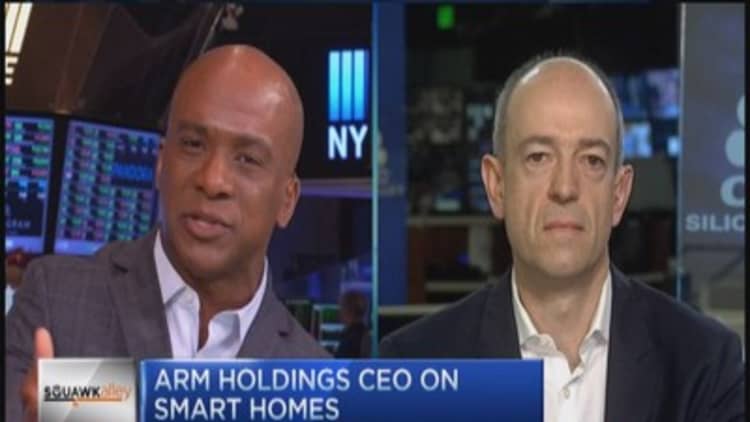What if, with the flick of a switch, you could turn your light fixture into a digital music player or a home monitor?
As consumer technology increasingly resembles hardware plucked from "The Jetsons," a host of companies, including Google, General Electric and Samsung, are looking to make everyday appliances as ubiquitous, indispensable—and as cool—as a new Apple device.
Count Sengled among those companies. The China-based company is one of several developing LED technology in what analysts at McKinsey estimate will grow into a $108 billion market by 2020.
How can a light bulb ever be considered cool? By adding on high-tech attributes such as a Bluetooth speaker and a camera. Sengled, which made $200 million in revenue last year from the technology, has done both.
Read MoreSure smart home tech is cool. But does it save you money?
Intelligent home technology means "we can do more with less," Alex Ruan, Sengled's general manager, told CNBC in an interview.
Since there are more than 8 billion sockets in the U.S., Ruan said LEDs fit seamlessly in the smart tech sector. "That's why home automation with smart bulbs makes all the sense in the world," he added. "It adds a lot of value so you don't have to constantly add devices to your home."
As functional as the iPhone?

Although the analogy may be considered a reach by some, Ruan compared Segled's tricked-out bulb to the iPhone, which the Cupertino, California-based giant used to successfully change consumer attitudes toward reading, web browsing and media consumption.
"People brought iPhones because it decluttered people's lives," Ruan said. "We think the simpler the installation, the simpler the use case and the less people have to pay for it. We are advocating buying less gear, but the intelligence is in the light bulbs."
Read MoreOn our way toward smart homes: ARM chief
Energy efficient residential technology is considered by analysts to be a major growth sector in the coming years. In a recent report, IHS said that "the sky is the limit" for smart lighting, adding that LEDs are "another way for companies to attempt to add value and improve profit margins." The report added that smart lighting was slowly eliminating traditional incandescent bulbs.
Against that backdrop, Sengled wants to make bulbs as functional as the smartphone. "By embedding consumer tech into LED lighting, we are able to reduce the cost of buying incremental devices in the home, so we help to reduce the cost of [home] ownership," Ruan said.
Home technology's emphasis on efficiency paves the way for consumers to contain electricity costs, which the Bureau of Labor Statistics data showed hit a record high last year, even as other fuel prices tumbled.
"The promise of smart home tech is to change the way we live (improve our quality of life), so convenience is the primary driver," Ruan said, adding that a major selling point of smart home tech products is also energy savings."
Privacy concerns
However, because most smart home devices run on wireless technology, some observers fear residences could become a prime target for hackers in an era when online security is becoming a hotly debated topic.
In a world where social media accounts and smart devices are routinely compromised, analysts point out it would pose little challenge for a hacker to access a home security system or a webcam. It also raises the question about whether companies like Sengled can navigate the shoals of privacy and efficiency.
"Consumers are entitled to privacy, but it is the protection of this privacy that is key to success," Ruan said, adding that most personal devices come with "a tradeoff between privacy and convenience" that most consumers tacitly acknowledge, if not completely accept.
In that vein, smart home hardware isn't altogether different from a credit card or a cell phone, which are considered secure, until they aren't.
"For the most part, our cards are secure and, in cases where our cards are physically or virtually stolen, the card issuing bank steps in to protect consumers from fraud," Ruan said. "We [also] view our mobile phones as highly secure," even in the possibility of wiretapping, he added.
Like card issuers and wireless companies, privacy fears will place the onus on smart technology providers to "ensure a high level of security," Ruan said.
"The underlying success of personal privacy lends to a business model where service providers are the entity that secure the network, devices, and services" he added.


